Contents
- Incumbents
- Events
- January
- February
- March
- April
- May
- June
- July
- August
- September
- October
- November
- December
- Deaths
- References
| |||||
| Decades: | |||||
|---|---|---|---|---|---|
| See also: | |||||
Events from the year 2007 in Myanmar :
| |||||
| Decades: | |||||
|---|---|---|---|---|---|
| See also: | |||||
Events from the year 2007 in Myanmar :
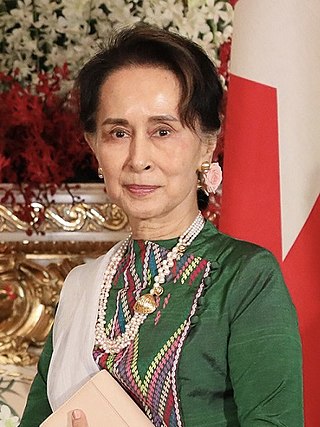
Daw Aung San Suu Kyi, sometimes abbreviated to Suu Kyi, is a Burmese politician, diplomat, author, and pro-democracy activist who served as State Counsellor of Myanmar and Minister of Foreign Affairs from 2016 to 2021. She has served as the general secretary of the National League for Democracy (NLD) since the party's founding in 1988 and was registered as its chairperson while it was a legal party from 2011 to 2023. She played a vital role in Myanmar's transition from military junta to partial democracy in the 2010s.

Historically strained, Myanmar's foreign relations, particularly with Western nations, have improved since 2012. Relations became strained once more in 2017 with the Rohingya genocide and due to the 2021 Myanmar coup d'état. Myanmar has generally maintained warmer relations with near states and is a member of the Association of Southeast Asian Nations.

Soe Win was the Prime Minister of Burma and Secretary-1 of the State Peace and Development Council from 2004 to 2007. He was known by Burmese dissident groups as "the butcher of Depayin" for his role as mastermind of the 2003 Depayin Massacre, in which 70 National League for Democracy supporters were killed by a government-sponsored mob.

Thein Sein is a Burmese politician and retired military general who served as the 9th President of Myanmar from 2011 to 2016. He previously served as prime minister from 2007 to 2010, and was considered by many in and outside Myanmar as a reformist leader in the post-junta government.
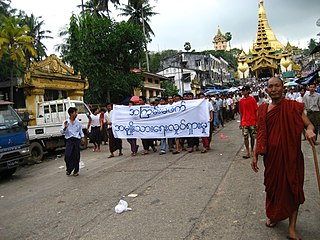
The Saffron Revolution was a series of economic and political protests and demonstrations that took place during August, September, and October 2007 in Myanmar. The protests were triggered by the decision of the national military government to remove subsidies on the sales prices of fuel. The national government is the only supplier of fuels and the removal of the price subsidy immediately caused diesel and petrol prices to increase by 66–100% and the price of compressed natural gas for buses to increase 500% in less than a week.
International reaction to the 2007 Burmese anti-government protests ranges from support of the protestors through neutrality to support of the State Peace and Development Council, the ruling junta. While most countries supported the protests and urged the Myanmar's State Peace and Development Council ruling military Junta to implement far-reaching reforms, several key countries, such as the People's Republic of China and India maintained commitment to the notion of noninterference. A number of protests against the Burmese Government's crackdown have been held worldwide.

Insein Prison is located in Yangon Division, near Yangon (Rangoon), the old capital of Myanmar. From 1988 to 2011 it was run by the military junta of Myanmar, named the State Law and Order Restoration Council from 1988 to 2003 and the State Peace and Development Council (SPDC) from 2003 to 2011, and was used largely to repress political dissidents.
This article details the chronology of events in the 2007 Burmese anti-government protests.

Nilar Thein is a Burmese democracy activist and political prisoner imprisoned from 2008 to 2012 at Thayet prison in Burma's Magway Region. Amnesty International considered her a prisoner of conscience.

Nyi Nyi Lwin, more widely known by his monastic name U Gambira, is a former Buddhist monk, activist and a leader of the All-Burma Monks' Alliance, a group which helped lead the 2007 protests against Burma's military government. Following the protests, he went into hiding and published two editorials critical of the Burmese government in The Washington Post and The Guardian on 4 November 2007. He was arrested the same day.

Htay Kywe is a repeatedly-imprisoned Burmese pro-democracy activist who was considered a prisoner of conscience by Amnesty International. BBC News describes him as a key member of the 8888 Generation movement.

The 88 Generation Students is a Burmese pro-democracy movement known for their activism against the country's military junta. Many of its members were imprisoned by the Burmese government on charges of "illegally using electronic media" and "forming an illegal organisation". A number of Western governments and human rights organisations called for the release of group members on the grounds that they were political prisoners.
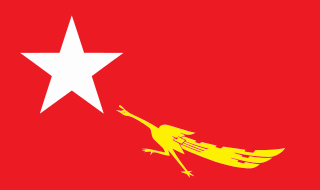
The 2011–2015 Myanmar political reforms were a series of political, economic and administrative reforms in Myanmar undertaken by the military-backed government. These reforms include the release of pro-democracy leader Aung San Suu Kyi from house arrest and subsequent dialogues with her, establishment of the National Human Rights Commission, general amnesties of more than 200 political prisoners, institution of new labour laws that allow labour unions and strikes, relaxation of press censorship, and regulations of currency practices. As a consequence of the reforms, ASEAN has approved Myanmar's bid for the chairmanship in 2014. United States Secretary of State Hillary Clinton visited Myanmar on 1 December 2011, to encourage further progress; it was the first visit by a Secretary of State in more than fifty years. United States President Barack Obama visited one year later, becoming the first US president to visit the country.
Ashin Wirathu is a Burmese Buddhist monk, and the leader of the 969 Movement in Myanmar. He has incited the persecution of Muslims in Myanmar through his speeches. Facebook banned his page on the charge of allegedly spreading religious hatred towards other communities, after repeated warnings to not post religiously inflammatory content.
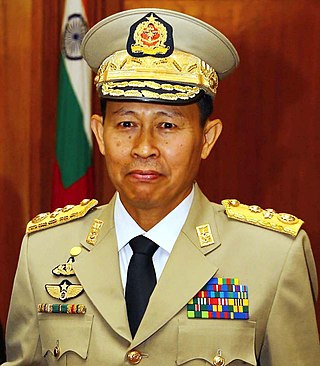
Soe Win is a Burmese army general and the current Deputy Prime Minister of Myanmar. Appointed following the formation of the provisional government on 1 August 2021, he holds essential roles, including Vice Chairman of the State Administration Council (SAC), Deputy Commander-in-Chief of the Tatmadaw, and Commander-in-Chief of the Myanmar Army. He is also a member of Myanmar's National Defence and Security Council (NDSC).
The Special Envoy of the Secretary-General on Myanmar is a special Representative of the Secretary-General of the United Nations created in 2018 to respond to the Rohingya genocide starting in August 2017 and its effects in Myanmar. According to the mandate established by the UN General Assembly in its resolution 72/248 in 2017, the Special Envoy "works in close partnership with all stakeholders including local communities and civil society, and regional partners, notably the Government of Bangladesh and the Association of Southeast Asian Nations (ASEAN), regional countries, and the broader membership of the United Nations."

A coup d'état in Myanmar began on the morning of 1 February 2021, when democratically elected members of the country's ruling party, the National League for Democracy (NLD), were deposed by the Tatmadaw, Myanmar's military, which then vested power in a military junta. Acting President of Myanmar Myint Swe proclaimed a year-long state of emergency and declared power had been transferred to Commander-in-Chief of Defence Services Senior General Min Aung Hlaing. It declared the results of the November 2020 general election invalid and stated its intent to hold a new election at the end of the state of emergency. The coup d'état occurred the day before the Parliament of Myanmar was to swear in the members elected in the 2020 election, thereby preventing this from occurring. President Win Myint and State Counsellor Aung San Suu Kyi were detained, along with ministers, their deputies, and members of Parliament.

The State Administration Council is the military junta currently governing Myanmar, established by Commander-in-Chief of Defence Services Min Aung Hlaing following the February 2021 coup d'état and the declaration of a state of emergency by the National Defence and Security Council. Under the constitution, the Commander-in-Chief holds absolute legislative, executive, and judicial power during a state of emergency. Min Aung Hlaing has delegated his legislative power to the SAC, which he chairs. It has formed a provisional administration, also led by Min Aung Hlaing as Prime Minister of Myanmar.
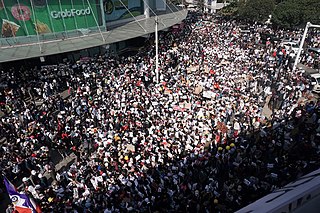
Protests in Myanmar, known locally as the Spring Revolution, began in early 2021 in opposition to the coup d'état on 1 February, staged by Min Aung Hlaing, the commander-in-chief of the country's armed forces, the Tatmadaw. As of 23 June 2022, at least 2000 protesters have been killed, 14,000 arrested and 700,000 displaced by the military junta.
Events in the year 2022 in Myanmar.